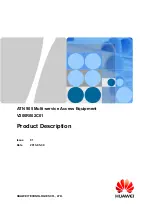
Introduction
The MOBOTIX Cloud Bridge
The MOBOTIX Cloud Bridge
The MOBOTIX Cloud Bridge is a critical component to making the MOBOTIX Cloud VMS operate. It is the con-
nection between the cameras and other input devices and the MOBOTIX Cloud data center. Without the
bridge, no data can get to the cloud, and no data or video can be seen by the user. The functions performed
by the bridge are many. We will not go into the details here, however, it is important to understand that the
bridge receives all the video (and audio) from the cameras. It also configures and controls IP cameras via the
camera’s ONVIF interface.
The Hardware
The bridge includes storage, which is intended as a buffer for when the Internet goes down or when band-
width is not available for other reasons. All video is accessed via the MOBOTIX Cloud VMS to provide for a
consistent user interface and better user experience. The user operates the system the same regardless of
where the video has been stored. The user experience is the same, so long as minimum upload bandwidth is
available. For a bridge, we recommend a minimum of 2 Mbps upload above the preview transmit.
Some models of the bridge have a video output connector and support
Local Display
. The current live video
can be displayed on a monitor attached to the bridge via this video connector. This is useful in many situ-
ations where a manager wants a continuous live view, or an overhead display is desired to show that sur-
veillance is in use. Local Display, like all items in the MOBOTIX Cloud VMS, is managed and configured from
the cloud.
Bridge Failure
The bridge is hardware that is located on the customer’s premise. It is a basic computer similar to a PC or
the insides of an NVR or DVR and is therefore susceptible to hardware failure. The MOBOTIX Cloud data cen-
ter is a fully redundant and distributed system, so it is insulated from single hardware failures. The bridge
however, can fail. These failures can be due to power supply failure, someone pulling the power plug, hard
disk failure, or general electronics failure. When the bridge fails, video recording will typically stop. In the
case of the bridge, video that has not been transmitted to the MOBOTIX Cloud data center yet may be lost.
The bridge will need to be replaced. Because all the configuration information for the bridge is stored in the
cloud, the replacement of the bridge is quick and painless. The MOBOTIX Cloud data center will push all the
configuration information for the bridge and all the cameras to the new device. The only work needed by the
technician or the customer is to physically replace the bridge.
Bridge Security and Maintenance
The bridge only communicates with the MOBOTIX Cloud data center. They do not require any inbound open
ports or firewall inbound openings.
The MOBOTIX Cloud bridges are remotely managed and maintained by MOBOTIX. No software updates, no
firmware patches, no security updates are needed by reseller or customer. This type of maintenance is done
automatically by the MOBOTIX Cloud VMS and makes for a more secure and more reliable environment.
26 / 102
Summary of Contents for Cloud Bridge
Page 1: ...User Guide MOBOTIX Cloud 2020 MOBOTIX AG V02_5 14 2020 ...
Page 4: ...4 102 ...
Page 5: ...5 102 2 Support ...
Page 7: ...7 102 3 Imprint ...
Page 9: ...9 102 4 Notices ...
Page 11: ...11 102 5 Legal Notes ...
Page 13: ...13 102 6 Delivered Parts Connectors and Dimensions ...
Page 17: ...17 102 7 Installation and Setup ...
Page 25: ...25 102 8 Introduction ...
Page 33: ...Fig 14 Adding cameras to a layout Introduction The Web User Interface 33 102 ...
Page 35: ...35 102 9 Camera Settings ...
Page 45: ...45 102 10 Bridge Settings ...
Page 51: ...51 102 11 User Management ...
Page 58: ...User Management Managing Users 58 102 ...
Page 59: ...59 102 12 History Browser ...
Page 73: ...Fig 58 Gallery Viewer choose display History Browser Using the Gallery Viewer 73 102 ...
Page 74: ...History Browser Using the Gallery Viewer 74 102 ...
Page 75: ...75 102 13 Motion Alerts and Regions of Interest ...
Page 83: ...83 102 14 Bandwidth Considerations ...
Page 91: ...91 102 15 Maps ...
Page 96: ...Maps Using Maps 96 102 ...
Page 97: ...97 102 16 System Alerts and Notifications ...
Page 100: ...System Alerts and Notifications Using System Alerts and Notifications 100 102 ...
















































